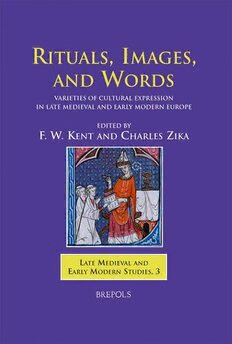
Rituals, Images, and Words: The Varieties of Cultural Expression In Late Medieval And Early Modern Europe PDF
460 Pages·2005·64.853 MB·English
Most books are stored in the elastic cloud where traffic is expensive. For this reason, we have a limit on daily download.
Preview Rituals, Images, and Words: The Varieties of Cultural Expression In Late Medieval And Early Modern Europe
Description:
The focus of this collection is on processes of cultural communication in late medieval/early modern European societies and the part which these resources play in shaping community and fashioning self and group identity. The individual essays focus on (1) different forms of cultural discourse in late medieval/early modern Europe; (2) the techniques, rhetoric, genres and cultural traditions which were drawn on in order to communicate particular messages to audiences in these societies and persuade them of their veracity; (3) the social and cultural values which these discourses helped fashion or support; (4) the manner in which different communities or regimes drew on these discourses to shape, strengthen or legitimate their identity or organization. The scope of the book is intentionally multi-disciplinary and, in the case of some articles, interdisciplinary. And although the majority of articles concentrate on Italian societies of the period, the inclusion of others which centre on other European societies of the period helps underline the fact that the developments explored are far from exclusive to the Italian peninsula, or common to all the societies of the Italian peninsula. This approach certainly reflects the interests of the editors, of most of the contributors and of the teacher these articles honour. Ian Robertson's teaching was marked by cross-disciplinary enthusiasms and also by a concern for the variety of Italian social and cultural institutions and experience within a broader European context. The general focus on cultural communication within different societies of this period also reflects what the editors believe to be a recent historiographical shift in the understanding of past societies. It is one which emphasizes interaction and performance over structure and norm; the instruments and processes by which meanings and value are communicated and enacted.
See more
The list of books you might like
Most books are stored in the elastic cloud where traffic is expensive. For this reason, we have a limit on daily download.
